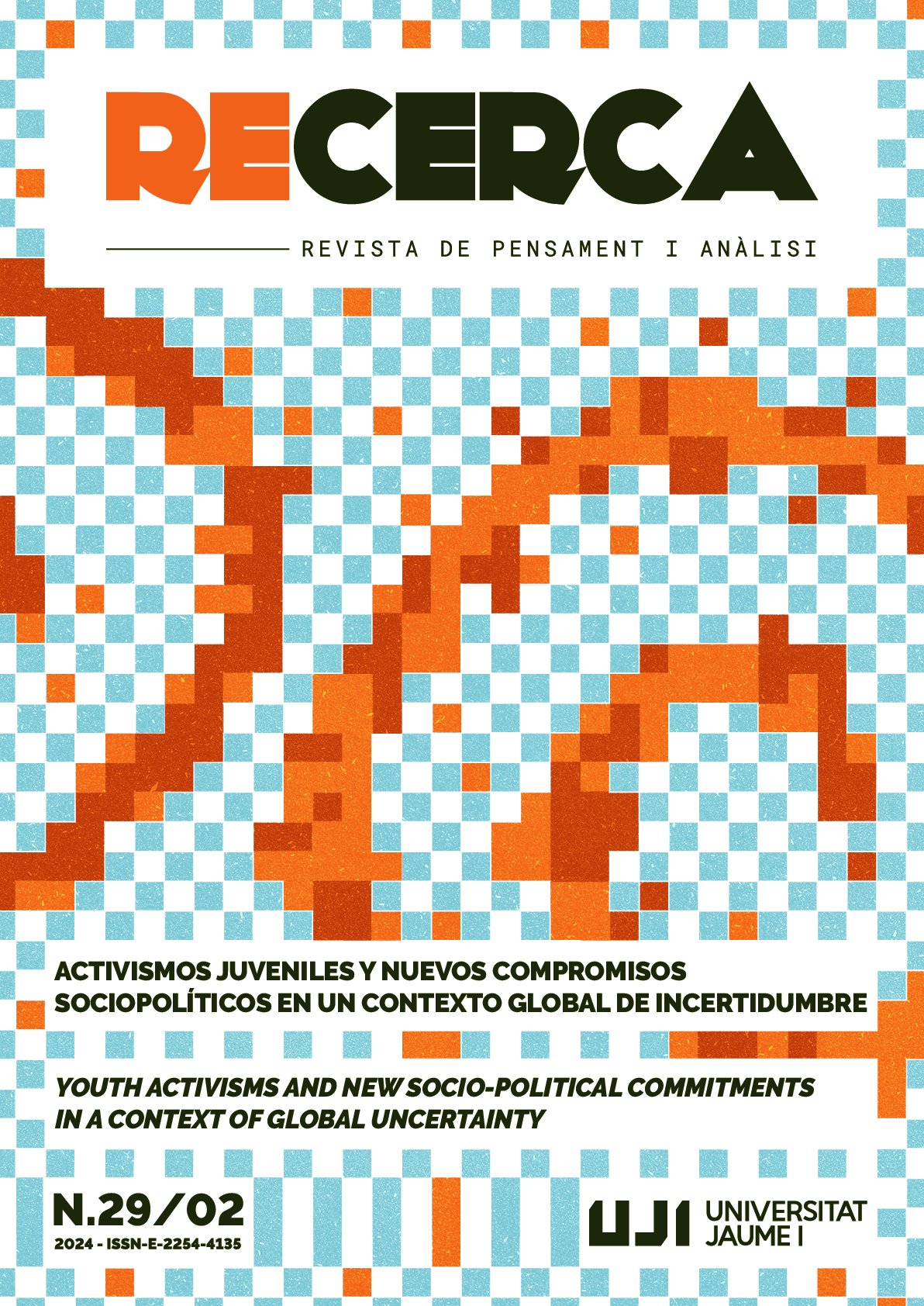Del movimiento estudiantil al Paro Nacional: oportunidades, bases y marcos para la movilización social en Colombia
Contenido principal del artículo
Resumen
Este artículo analiza el ciclo de movilización social en Colombia 2011-2021 e indagando por los cambios que se dieron en términos de actores, agendas y repertorios. Se argumenta que durante este periodo hubo una ampliación de la base de movilización social, una diversificación de las demandas y reivindicaciones de los manifestantes, y una transformación en sus repertorios de movilización. El acertamiento teórico a este análisis se hace desde el proceso político y los marcos colectivos, dos herramientas que permiten entender los procesos de creación de oportunidades políticas y la expansión de los alineamientos de marcos. La información recopilada se basa en un trabajo de observación participante de la autora en distintas marchas, protestas, concentraciones en plazas públicas, asambleas y debates durante el periodo 2019-2021, y se complementa con datos estadísticos de la base de datos de Luchas Sociales del Centro de Investigación y Educación Popular- CINEP y del Latin American Public Opinion Porject de la Universiad de Vanderbilt.
Descargas
Detalles del artículo
Citas
Aguilar-Forero, N. (2020). Las cuatro co de la acción colectiva juvenil: el caso del paro nacional de Colombia (noviembre 2019-enero 2020). Análisis Político, 33(98), 26–43. https://doi.org/10.15446/anpol.v33n98.89408
Álvarez-Rodríguez, A. A. (2022). El Paro Nacional en Colombia 2021: explosión social entre dinámicas estructurales y de coyuntura. Relevancia de la acción política y del diálogo en su desarrollo y transformación. Prospectiva. https://doi.org/10.25100/prts.v0i33.11864
Archila Neira, M. (2019). Control de las protestas: una cara de la relación Estado y Movimientos Sociales, 1975-2015. In M. Archila Neira, M. C. García Velandia, L. Parra, & A. M. Restrepo (Eds.), Cuando la copa se rebosa: Luchas sociales en Colombia, 1975-2015 (pp. 95–155). Bogotá D.C.: CINEP- Programa por la Paz.
Brown, W. (2003). Neoliberalism and the End of Liberal Democracy. Theory and Event, 7(1).
Autora (2022).
CIDH. (2021). Observaciones y recomendaciones. Visita de trabajo a Colombia. Bogotá D.C.
Cruz Rodríguez, E. (2017). La rebelión de las ruanas: 1el paro nacional agrario en Colombia. Análisis, 49(90), 83–109.
Della Porta, D. (1996). Social Movements and the State: Thoughts on the Policing Protest. In D. McAdam, J. McCarthy, & M. Zald (Eds.), Comparative Perspectives on Social Movements. Political Opportunities, Mobilizing Structures and Cultural Framings (pp. 62–92). Cambridge: Cambridge University Press.
Dinerstein, A. (2013). Autonomía y Esperanza. La Nueva Gramática de la Emancipación. In A. C. Dinerstein (Ed.), Movimientos Sociales y Autonomía Colectiva. La Polítia de la Esperanza en América Latina (pp. 149–172). Buenos Aires: Capital Intelectual.
Harvey, D. (2007). Neoliberalism as Creative Destruction. The Annals of the American Academy of Political and Social Science, 610(21), 21–44.
Held, D. (2007). Modelos de Democracia. Madrid: Alianza Editorial.
López Montaño, C., & Pachón Baena, J. D. (2022). El antes y el después del neoliberalismo en Colombia. In J. R. Aparicio Cuervo & M. Fernández Pinto (Eds.), Neoliberalismo en Colombia. Contextos, complejidad y política pública (pp. 99–131). Bogotá D.C.: Ediciones Uniandes.
McAdam, D., Tarrow, S., & Tilly, C. (2001). Dynamics of Contention. Cambridge: Cambridge University Press.
Mora Cortés, A. F. (2016). La Seudorrevolución Educativa. Desigualdades, capitalismo y control de la educación superior en Colombia. Bogotá D.C.: Editorial Javeriana.
Negret-Mosquera, C. A. (2021). Informe final para el esclarecimiento de los hechos ocurridos los días 9 y 10 de septiembre de 2020. Bogotá D.C.
Polanyi, K. (2003). La Gran Transformación: los Orígenes Políticos y Económicos de Nuestro Tiempo. México: Fondo de Cultura Económica.
Rojas Sotelo, M., & Quintana Porras, L. (2022). Sobre la primera y la última línea. Los vencidos de la historia y sus luchas por abrir el porvenir (Colombia, paro nacional, 2021). Canadian Journal of Latin American and Caribbean Studies / Revue Canadienne Des Études Latino-Américaines et Caraïbes, 47(3), 346–368. https://doi.org/10.1080/08263663.2022.2110718
Snow, D., Rochford, E. B., Worden, S., & Benford, R. (1986). Frame Alignment Process, Microbolization and Movement Participation. American Sociological Review, (51), 464–481.
Tarrow, S. (1992). Mentalities, Political Cultures, and Collective Actions Frames”. In A. Morris & C. M. Mueller (Eds.), Frontiers in Social Movement Theory. New Haven : Yale University Press.
Tarrow, S. (1994). Mentalities, Political Cultures, and Collective Actions Frames. In A. Morris & C. McClurg (Eds.), Frontiers in Social Movement Theory. New Haven: Yale University Press.
Tarrow, S. (1997). El Poder en Movimiento. Madrid: Alianza Editorial.
Tilly, C. (2010). Los Movimientos Sociales, 1768-2008. Desde sus Orígenes a Facebook. Barcelona: Crítica.


